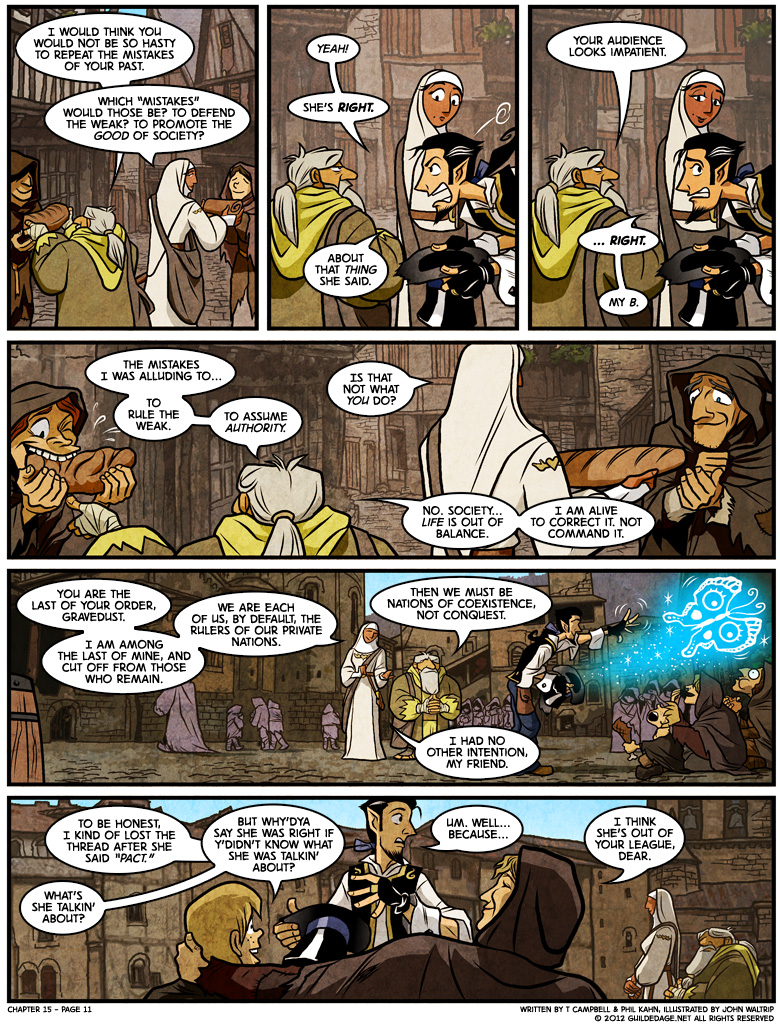Annotated 15-11
 E-Merl’s dialogue is almost entirely added by Phil here (all I had was “Yeah” and then him hesitating, unsure how to follow it up). This is a clear improvement.
E-Merl’s dialogue is almost entirely added by Phil here (all I had was “Yeah” and then him hesitating, unsure how to follow it up). This is a clear improvement.
So I’ve been thinking about Alan Moore again lately.
The last comics script he wrote before his retirement from the field was published a month or so ago, and it’s a solidly middle-of-the-road example of his work, sprightly, entertaining, and playful without being either transcendentally revolutionary (the things Watchmen, Swamp Thing, and From Hell taught the whole field is a debt we can never repay) or unbearably excessive (dude, I’m sorry, but I’ve BEEN to your hometown, and it is just NOT INTERESTING ENOUGH to be worth a 300-page novel, a 1,300-page novel, AND a movie).
The reason I bring him up is that there are a few contradictions in his writing that I think he never fully addressed or resolved. One of them is a clear love for the heroic spirit (transcending his views about super-heroes, which changed several times over the course of his career), set against a sort of hermitic conviction that power must always corrupt and that the only way to live honestly is to avoid power and its structures as much as possible. While there’s something to be said for the latter philosophy, at times it seems to me like an abdication of responsibility, even a romanticization of introversion.
And that seems to me like what Gravedust is at risk of slipping into here. The mystics are dead, the Savasi are lost, and Gravedust is heroic enough to want to put things right, but so uncomfortable is he with politics and power that he thinks there’s some noble way to do that that doesn’t involve “assuming authority.” FLASH FORWARD: Thirty-one chapters later, Gravedust will assume warchief powers over the Savasi, using his fists.
At the end of the series, Rachel will not live to change the world directly as she might have hoped to do, but her indirect influence has a pretty big footprint. Frigg and E-Merl will carry on in her name. And while many life experiences will nudge Gravedust into his ultimate destiny, this conversation is one of them.











I think there is difference between seeking power and authority over others and “assuming authority” when there is no better option or no clearly acceptable leader. Lincoln wanted to be President to preserve the United States not to free the slaves in the south. But he had to assume the role of a War President as the war was thrust upon him. You also see in combat when a leader is killed and someone steps up and fills the leadership role.
I always think of the Alan Moore novel I tried to read, only to give up after discovering that he essentially wrote the first part in code. I love a lot of his work but not enough to translate the thoughts of a caveman into understandable English.
Re. caveman thoughts, this should sort you out.
That would be Voice of the Fire. I had similar issues with it, went back to the novel a couple of times over the years but never finished it.
To my eternal shame, I haven’t even started on Jerusalem yet.
In my experience in life, in my observations of it, power can corrupt but it’s usually not the power that does it. The power is certainly a part of how it comes to be but the truth is far more sinister and rarely gets looked out. It’s the complacency that comes with power. When one becomes wealthier they stop thinking about the problems they had when they were poorer and start thinking of other problems. When one raises themselves out of poverty, however easy or hard it was for them, they start to wonder why others can’t do the same.
The answer is usually not the power or wealth that these people have that let them cast off their empathy for others, it’s the complacency. They don’t remember as keenly the pain of not eating for a week, of getting sick on dirty tap water, on struggling to pay bills on a full time job. They either believe that they are proof anyone can climb out from that hole or they simply forget that the hole even really exists, or at least how deep it is.
The distance kills empathy.
I always thought no one should inherit a dime, or enjoy more then the base of what the lowest in a country enjoys, until the age of 25. I think a bit of empathy and understanding at an early age can do wonders to raise that hole to a nice, comfortable floor where everyone can be happy, and anyone who wants to climb up a bit into the sky has the comfort of knowing the fall won’t be so far, or nearly so life threatening.